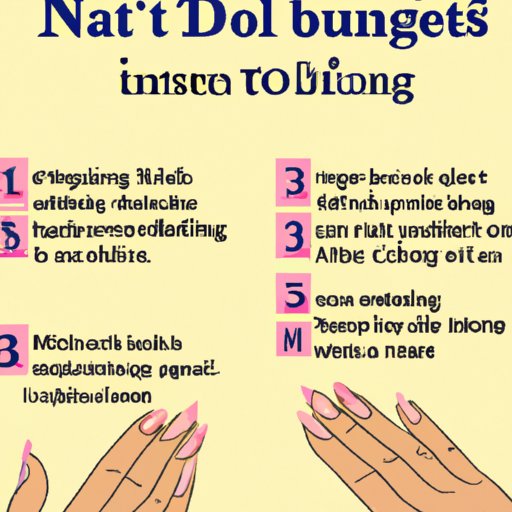Introduction
Nail biting is a common habit that can cause damage to your nails, cuticles, and surrounding skin. It’s also known as onychophagia, and it affects up to 25 percent of children and 45 percent of adults. People may bite their nails for a variety of reasons, from boredom and stress to anxiety and underlying medical conditions. Fortunately, there are several strategies you can use to stop biting your nails.
Why Do People Bite Their Nails?
Nail biting is often a sign of underlying psychological or emotional issues. According to a 2009 study, nail biting has been associated with perfectionism, impulsiveness, frustration, and loneliness. Other possible causes include boredom, hunger, and a low self-esteem.
For some people, nail biting is a way to cope with stress and anxiety. A 2017 study found that nail biters had higher levels of stress than non-biters, and they were more likely to engage in other compulsive behaviors such as skin picking and hair pulling.
In some cases, nail biting may be related to an underlying medical condition. Obsessive-compulsive disorder (OCD) and attention-deficit/hyperactivity disorder (ADHD) are two examples of conditions that may lead to nail biting.
How to Stop Biting Your Nails
Breaking the habit of nail biting takes time and patience. Here are a few tips to help you get started:
1. Keep your nails trimmed short
Keeping your nails short can make it harder to bite them. You may find it helpful to trim them every few days or use nail clippers to keep them short.
2. Wear gloves or bandages on your fingers
Covering your nails with gloves or bandages can serve as a physical reminder not to bite them. It can also protect your nails from damage caused by biting.
3. Paint your nails with a bitter-tasting nail polish
There are special types of nail polish designed to taste bitter when bitten. This can act as a deterrent and discourage you from biting your nails.
4. Distract yourself with other activities
Whenever you feel the urge to bite your nails, try to distract yourself with another activity. Take a walk, call a friend, read a book, or do something else that will take your mind off nail biting.
5. Practice relaxation techniques such as deep breathing
Deep breathing is a simple yet effective relaxation technique that can help reduce stress and anxiety. When you feel the urge to bite your nails, take a few slow, deep breaths to help calm your mind and body.
6. Seek professional help if your nail biting is related to an underlying condition
If your nail biting is related to an underlying condition such as OCD or ADHD, it’s important to seek professional help. A mental health professional can provide advice and treatment options that can help you break the habit.
7. Reward yourself for not biting your nails
Rewarding yourself for not biting your nails can be a great motivator. Treat yourself to a manicure, buy a new nail polish, or give yourself a pat on the back whenever you resist the urge to bite your nails.
Conclusion
Biting your nails can be a difficult habit to break, but it’s possible with the right strategies. Keeping your nails trimmed short, wearing gloves or bandages, painting your nails with a bitter-tasting polish, distracting yourself with other activities, practicing relaxation techniques, seeking professional help if needed, and rewarding yourself for not biting your nails can all help you stop nail biting for good.
(Note: Is this article not meeting your expectations? Do you have knowledge or insights to share? Unlock new opportunities and expand your reach by joining our authors team. Click Registration to join us and share your expertise with our readers.)
